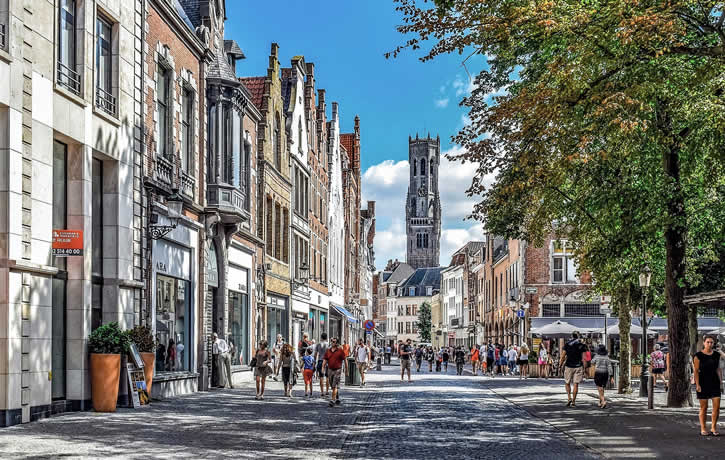Different French Dialects and Accents
Monday April 24, 2023 | French Language | Posted by French Abroad
French is spoken by millions of people around the world and has various dialects and accents that can vary greatly from region to region. Understanding these differences can be helpful for those who are learning French or for those who are traveling to French-speaking countries. In this blog post, we’ll take a look at some of the most common French dialects and we’ll show different French Dialects and Accents.
Standard French Standard French, also known as Parisian French, is the official language of France and is used in government, education, and media. It is the most widely recognized form of French and is the standard used in most French language textbooks.
Regional French Dialects
Beyond Standard French, there are several regional dialects in France, including Alsatian, Breton, Corsican, and Provençal, to name a few. These dialects have their own unique accents, French vocabulary, and grammar rules. There are more different French Dialects and Accents looking at the different countries where French is spoken, like in Canada, Belgium, the Carribbean and in Afrika.
Canadian French
Canadian French is a dialect of French that is spoken in Canada, particularly in Quebec. It has a unique accent and vocabulary, and it is different from Standard French in many ways. Canadian French also has its own regional dialects, such as Acadian French and Quebec French.
Vocabulary
Canadian French has a unique vocabulary, with many words and expressions that are not commonly used in Standard French. For example, in Canadian French, the word for a grocery bag is “sac d’épicerie”, while in Standard French it is “sac de courses”.
More examples of typical words or expressions used in Canadian French that may differ from Standard French:
- “Dépanneur” – a corner store or convenience store
- “Tuque” – a woolen cap worn in winter, also called “bonnet” in Standard French
- “Crisse” – a vulgar expression equivalent to “damn” or “shit”
- “Magasiner” – to go shopping
- “Char” – a car or automobile, equivalent to “voiture” in Standard French
- “Poudrerie” – a snowstorm or blizzard
- “Câlisse” – a vulgar expression equivalent to “fuck”
- “Guichet” – an ATM or bank teller window, equivalent to “distributeur automatique de billets” or “guichet automatique” in Standard French
- “Patente” – a thing, object or item, equivalent to “chose” in Standard French
- “Hocher” – to shake, equivalent to “secouer” in Standard French
Pronunciation:
Canadian French has a distinct accent that sets it apart from Standard French. For example, Canadian French tends to pronounce the letter “r” more strongly, while Standard French tends to have a more muted pronunciation.
Grammar:
Canadian French has its own set of grammatical rules and structures that are different from Standard French. For example, in Canadian French, the subjunctive mood is used more frequently in spoken language, while in Standard French it is more commonly used in formal writing.
While Canadian French and Standard French share many similarities, there are also clear differences in vocabulary, pronunciation, and grammar. Understanding these differences can be helpful for those who are traveling to Canada or for those who are learning French in Canada.
Caribbean French
Caribbean French is a dialect of French that is spoken in the Caribbean, particularly in Haiti, Guadeloupe, and Martinique. It has a unique accent and vocabulary, and it is influenced by African and Creole languages.
Vocabulary:
Caribbean French uses some French words and expressions that are not commonly used in France. For example, in Caribbean French, the word for a parent is “manman” or “papa”, while in Standard French it is “père” or “mère”.
Pronunciation:
Caribbean French often has a sing-song quality to its speech, with a rise and fall in tone, while Standard French is usually more neutral in tone.
Grammar:
There are some differences in grammar rules too. In Caribbean French, the use of the passé simple tense is less common, and the use of the present tense is more widespread, while in Standard French the passé simple is more commonly used.
Learn French Abroad
If you want to improve your French skills and make a great trip, why not participate in a French language course Abroad? If you want to improve your French, immersing yourself in French culture in a country where French is spoken, like France, Switzerland or Canada, is one of the best ways to achieve this.
Belgian French
Belgian French is a dialect of French that is spoken in Belgium, particularly in the French-speaking region of Wallonia. There are a few interesting differences between Belgian French and French or standard French.

Belgian French has its own unique vocabulary, with many words and expressions that are not commonly used in Standard French. For example, in Belgian French, the word for a sandwich is “tartine”, while in Standard French it is “pain-beurre”.
Pronunciation:
The Belgians tend to have a more ‘nasal’ speech and pronounce more the ‘r’ whereas the French have a softer way of speaking and use more their throats to speak. However, the differences in pronunciation between French and Belgian French are relatively subtle.
- Nasal vowels: In French, nasal vowels (such as “on” and “an”) are pronounced with a distinct nasal sound, whereas in Belgian French, they are often pronounced with a more oral sound. For example, “bon” (good) in French is pronounced with a nasal sound, while in Belgian French it is often pronounced with a more oral “bawn” sound.
- Pronunciation of “r”: In French, the “r” sound is often pronounced with a uvular or guttural sound, while in Belgian French it is often pronounced with a softer, more rounded sound, similar to the Spanish “r”.
- Vowel sounds: There are some differences in the way certain vowel sounds are pronounced in French and Belgian French. For example, the “e” sound is often pronounced more closed in Belgian French, while the “u” sound is often pronounced more rounded.
- Intonation: Belgian French has a distinctive intonation pattern, with a rising intonation at the end of sentences. This is in contrast to French, which often has a falling intonation at the end of sentences.
African French
African French is a term used to describe the French dialects spoken in African countries, such as Senegal, Côte d’Ivoire, Cameroon and Morocco. African French has its own accent, vocabulary, and grammar rules, and it is influenced by local African languages. Read more about Moroccon French below.
Moroccan French
Moroccan French, also known as Maghrebi French, is a dialect of the French language spoken in Morocco. It is influenced by the Arabic and Berber languages, as well as by the historical and cultural context of Morocco.

When learning French, you don’t have to worry about the different French Dialects and Accents, unless you are specifically more interested in one of the countries and you are a more advanced speaker.




Leave a Reply